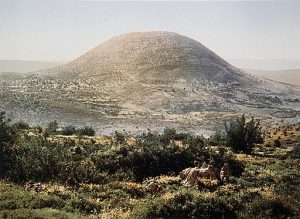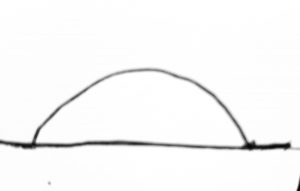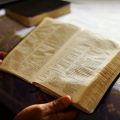During a time the children of Israel had strayed from serving the Lord, Deborah became a judge and a prophetess for the people. One day she sent for a man named Barak. Her opening statement makes it sound like Barak had already received revelation from the Lord and the Lord provided a second witness through Deborah that what Barak had received was the Lord’s will.
Deborah said to Barak,
Hath not the Lord God of Israel commanded, saying, Go and draw toward mount Tabor, and take with thee ten thousand men of the children of Naphtali and of the children of Zebulun?
And I will draw unto thee to the river Kishon Sisera, the captain of Jabin’s army, with his chariots and his multitude; and I will deliver him into thine hand.
And Barak said unto her, If thou wilt go with me, then I will go: but if thou wilt not go with me, then I will not go.
And she said, I will surely go with thee: notwithstanding the journey that thou takest shall not be for thine honour; for the Lord shall sell Sisera into the hand of a woman. And Deborah arose, and went with Barak to Kedesh.
And Barak called Zebulun and Naphtali to Kedesh; and he went up with ten thousand men at his feet: and Deborah went up with him.
Going Up to Mount Tabor

Color photo of Mount Tabor taken in the Late 19th century by French photographer, Bonfils
With Deborah’s presence, Barak obediently formed the army and they all went up to Mount Tabor.
Mount Tabor rises almost 2,000 feet from the plains, a half-spherical hill in Lower Galilee. Christian tradition identifies Tabor as the Mount of Transfiguration. But that history hadn’t occurred when Deborah, Barak, and the army of men from Zebulun and Naphtali obeyed the Lord’s counsel to go up to Tabor.
Going to the River Kishon
When Sisera heard about Barak’s army on Mount Tabor, he readied his 900 chariots of iron and all the people that were with him and went to the River Kishon.
The scripture records:
And the Lord , and all his chariots, and all his host, with the edge of the sword before Barak; so that Sisera lighted down off his chariot, and fled away on his feet.
The Lord Fights the Battles at Mount Tabor
How did the Lord discomfit Sisera’s hosts leaving them vulnerable to Barak’s army? What would make Sisera leave his strategically advantageous chariot?
Judges 5 is the Song of Deborah. She starts off her song of praise and worship this way:
Praise ye the Lord for the avenging of Israel, when the people willingly offered themselves.
Hear, O ye kings; give ear, O ye princes; I, even I, will sing unto the Lord; I will sing praise to the Lord God of Israel.
Lord when thou wentest out…the earth trembled, and the heavens dropped, the clouds also dropped water.
I imagine the Lord sending a miraculous torrential storm flooding the banks of the river and rendering chariots useless and stuck in the mud.
So to save himself, Sisera left his chariot stuck in the mud and ran and ran to Heber and Jael’s tent where he ultimately perished at Jael’s hand.
The Canaanite God Failed His Worshippers
This salvation through storm fascinates me because Sisera’s god was Ba’al, the Canaanite weather god with specific power over wind, rain, lightning, and fertility. The Canaanites attributed their dry summers to Ba’al’s summer visits to the underworld. He returned from the underworld and brought fall rains to revive the earth. But in this day of battle, their god failed them.
Sisera and his 900 iron chariots found passage along the River Kishon until the Lord discomfited them there and
The river of Kishon swept them away, that ancient river, the river Kishon. O my soul, hast trodden down strength.
The Kishon River also became the endpoint for the priests of Ba’al who contended in Elijah’s sacrifice challenge.
And Elijah said unto them, Take the prophets of Baal; let not one of them escape. And they took them: and Elijah brought them down to the brook Kishon, and slew them there.
Let Them Be As the Sun
The Lord commanded the Israelites to go up to Tabor. At His word, they descended from the mountain to the plains where Sisera’s army were near the river. Then, in miraculous fashion, the Lord fights the battle leaving the Israelites with a victory after some effort. Even though Barak reluctantly accepted this call to gather and lead the Lord’s people into battle, he still saw a victory. Because of the Lord, Israel was victorious.
Deborah’s recounting of the war song ends with beautiful imagery:
So let all thine enemies perish, O Lord: but let them that love him be as the sun when he goeth forth in his might.
When I sat with this story this time, I made a quick stick figure drawing of Mount Tabor. Unexpectedly, It reminded me of a sunrise and representations of images symbolizing when Heaven meets Earth.
So when Deborah sang of the Lord’s followers to be as the “sun,” I saw a connection between Barak’s revelation in going to a physical mountain to see the Lord’s power and might revealed and my going to the mountain, in all of its forms and meanings, armed with the Lord’s word and with faith that He will deliver me, too.
I am a member of The Church of Jesus Christ of Latter-day Saints. I have moved 64 times and have not tired of experiencing this beautiful earth! I love the people, languages, histories/anthropologies, & especially religious cultures of the world. My life long passion is the study & searching out of religious symbolism, specifically related to ancient & modern temples. My husband Anthony and I love our bulldog Stig, adventures, traveling, movies, motorcycling, and time with friends and family.







